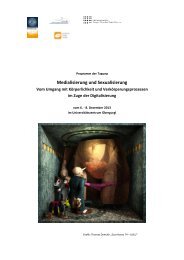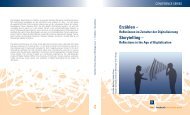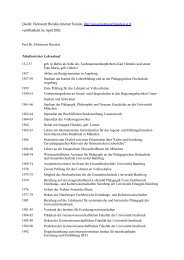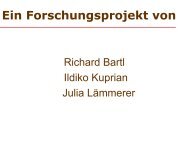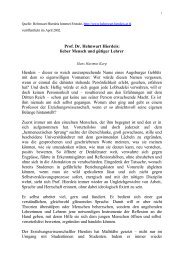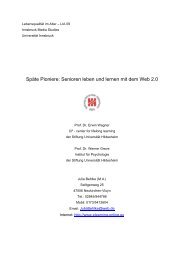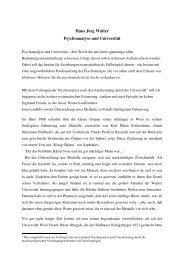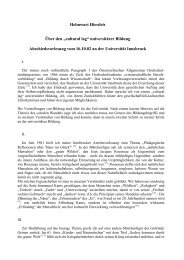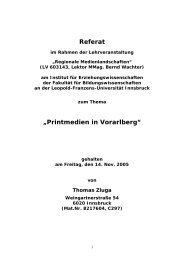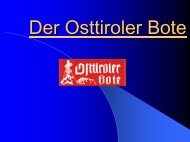Download pdf - Universität Innsbruck
Download pdf - Universität Innsbruck
Download pdf - Universität Innsbruck
Sie wollen auch ein ePaper? Erhöhen Sie die Reichweite Ihrer Titel.
YUMPU macht aus Druck-PDFs automatisch weboptimierte ePaper, die Google liebt.
122 Andrea Hemetsberger<br />
> > Might it be helpful to drop the “existing” and “source”– label and make<br />
> > the “source” semi-transparent or some other effect to show that it's not<br />
> > existent at the destination folder rather than being about to be copied?<br />
> Perhaps the concept should be “current document, rather than source file”.<br />
> I did like the arrow too, although obviously the CPU load for the animation<br />
> would need to be tunable for low performance machines.<br />
When the idea of this arrow came to my mind i was indeed thinking of a<br />
non-animated one. but this is something for our kde-artists :) i believe even a<br />
non-animated arrow will make clear what happens to which file in which direction.<br />
Knowledge, herein, is not only shared but instead created in discourse among contributors,<br />
creating even more valuable resources. Contributors have developed various forms of figurative<br />
language in order to overcome the problem of abstract, text-based talk. As the discourse<br />
shows, KDE developers use analogies to express and materialize their thoughts<br />
regularly so as to create a basis for collective reflection, and sharing. Power in online relationships<br />
is not contingent upon the possession of resources but instead upon the amount<br />
of shared cultural resources. Through materialization in source code, reflections on discussion<br />
lists, or textual narratives on Websites, F/OSS communities lay ground for sharing<br />
intellectual resources, and developing economic capital in the form of freely available<br />
software.<br />
Whereas knowledge is created within community boundaries as it requires involvement<br />
and a certain level of expertise on the side of the developers, software as the F/OSS community’s<br />
source of economic value is shared across boundaries with the public. Sharing<br />
software, however, does not necessarily include social bonding. Only intense knowledge<br />
sharing and creation in constant interaction with others also strengthens social ties and<br />
leads to close friendships. Thus, boding is an intense form of sharing and building social<br />
capital that is dependent on expertise and strong commitment to contribute. Bonding as a<br />
practice of sharing exhibits strong similarities to what Belk (2010) has described as forms<br />
of sharing as part of companionship. Sharing is not the only way in which we may connect<br />
with others, but it is a potentially powerful one that creates feelings of solidarity and<br />
friendship, as we can read in the following quotes.<br />
“A place to belong to. I found my home.” (contributor)<br />
“The user community surrounding it is also an intelligent and whimsical<br />
bunch, working on all sorts of interesting applications, so it’s fun to hang out<br />
with them, even if it’s only virtually.” (contributor)<br />
Sharing differs from economic exchange, which rarely creates friendship among people.<br />
Economic exchange may create economic obligations between buyers and sellers, but it



